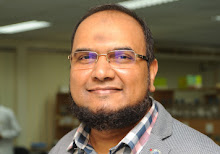29 June 2010 Freie Universitaet Berlin
06 August 2010 University of Hyderabad
(Press Release)
Research in Collaboration with Indian University of Hyderabad Studies Expression of Infectious Diseases as a Function of Genetic Factors.
The German Research Foundation (DFG) has set up a new international research training group (GRK) at Freie Universität Berlin. The projects of GRK 1673 "Functional Molecular Epidemiology Infection" at the Department of Veterinary Medicine (Speaker, Lothar H Wieler) deal with the factors that determine the severity and the geographic spread of infectious diseases. Among other things, the research deals with the immediate causes of tuberculosis, filariasis, or malaria. The University of Hyderabad in India is the cooperation partner (Speaker, Niyaz Ahmed).
Research at the joint facilities of Freie Universität Berlin, which acts as the host university, and the University of Hyderabad focuses on the areas of host-pathogen genomics and economic analysis of genetic variations. The comparative analysis of infectious diseases in Germany and India will provide information on the pathogen and host factors that influence the disease. "The outstanding expertise of the Indian partner(s) in the areas of bioinformatics and disease cohorts managed in Greater Hyderabad coupled with the extensive expertise of the Berlin partner in infection biology and epidemiology are a wonderful basis for an exciting and successful intercultural collaboration for the benefit of patients," said Professor Lothar H. Wieler, director of the research training group.
The new DFG research training groups offer graduate students an opportunity to complete their doctorates in a structured research and training program at a highly specialized level. "Students of medicine, veterinary medicine, or biology will find excellent conditions at Freie Universität," said Professor Wieler. "Our new international research training center offers outstanding conditions for completing a doctorate in one of these areas." This also means the opportunity to gain international experience: the program at Freie Universität includes a stay in India.
Overall, the DFG has set up 12 new research training groups to further improve conditions for young researchers in Germany. During the first funding period of four and a half years, they are being supported by the DFG with a sum of around 45 million euros. Three of the new facilities are international research training groups, which cooperate closely with foreign universities. The DFG currently funds 219 research training groups, including 55 international ones.
The German Research Foundation (DFG) has set up a new international research training group (GRK) at Freie Universität Berlin. The projects of GRK 1673 "Functional Molecular Epidemiology Infection" at the Department of Veterinary Medicine (Speaker, Lothar H Wieler) deal with the factors that determine the severity and the geographic spread of infectious diseases. Among other things, the research deals with the immediate causes of tuberculosis, filariasis, or malaria. The University of Hyderabad in India is the cooperation partner (Speaker, Niyaz Ahmed).
Research at the joint facilities of Freie Universität Berlin, which acts as the host university, and the University of Hyderabad focuses on the areas of host-pathogen genomics and economic analysis of genetic variations. The comparative analysis of infectious diseases in Germany and India will provide information on the pathogen and host factors that influence the disease. "The outstanding expertise of the Indian partner(s) in the areas of bioinformatics and disease cohorts managed in Greater Hyderabad coupled with the extensive expertise of the Berlin partner in infection biology and epidemiology are a wonderful basis for an exciting and successful intercultural collaboration for the benefit of patients," said Professor Lothar H. Wieler, director of the research training group.
The new DFG research training groups offer graduate students an opportunity to complete their doctorates in a structured research and training program at a highly specialized level. "Students of medicine, veterinary medicine, or biology will find excellent conditions at Freie Universität," said Professor Wieler. "Our new international research training center offers outstanding conditions for completing a doctorate in one of these areas." This also means the opportunity to gain international experience: the program at Freie Universität includes a stay in India.
Overall, the DFG has set up 12 new research training groups to further improve conditions for young researchers in Germany. During the first funding period of four and a half years, they are being supported by the DFG with a sum of around 45 million euros. Three of the new facilities are international research training groups, which cooperate closely with foreign universities. The DFG currently funds 219 research training groups, including 55 international ones.


No comments:
Post a Comment